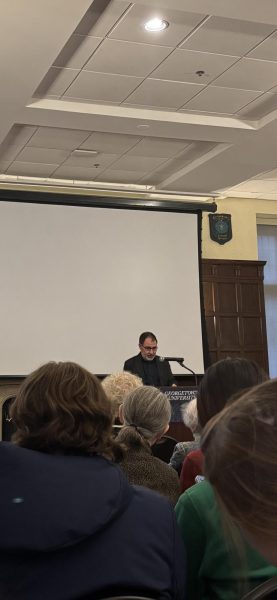An author and academic called on individuals to reframe hope and resilience in the face of challenges at a Georgetown University event April 7.
Vincent Miller, the director of doctoral studies in the religious studies department at the University of Dayton, focused his talk on understanding hope through a theological and literary lens. The event, titled the Robert S. Mason Lecture, is an annual series endowed in the name of a public affairs executive who studied world religions at Georgetown in his retirement.
Miller said individual disorientation, which varies in intensity, is detrimental to feelings of hope.
“It’s possible to become disoriented on multiple levels, from the personal to the societal and cultural,” Miller said at the event. “On the simplest level, our own personal plans are thrown off track and the work we’ve done towards some goal is disrupted, but the scale can go from the personal to a more extensive level of disorientation.”
“Beyond crises within stable systems or personal crises which require reorienting our efforts, this more extensive level comprises broader systemic crises which ruin the very coordinates by which we reorient ourselves,” Miller added.
Miller is also the author of “Consuming Religion: Christian Faith and Practice in a Consumer Culture,” a book examining the intersection of religion and modern materialism.

Miller said how we experience hope is influenced by Western cultural notions of the mind.
“We experience life from a distance in an inner mental space,” Miller said. “This partly comes from secularization in the West, where the boundary between agents and forces, the boundary between mind and the world, is fuzzy, porous and open to influences from other persons, beings and objects.”
“We can see how this buffer is implicit in the understanding of hope that we discuss — we experience profound feelings of loss and chaos in our interior mental space, in our emotional space,” Miller added.
Tod Linafelt, a professor of biblical literature in the theology department at Georgetown, introduced Miller, saying his contributions to the theological space are wide-ranging and crucial to public understanding.
“Vince Miller is, quite simply, one of the most interesting theologians working today,” Linafelt said at the event. “His book remains a formative work, and since that book, Vince has continued to explore — in numerous publications — questions of consumerism, globalization, our current moment of ecological crisis and, more generally, the task of public theology in relation to the common good.”
Miller said that Christian theologian Thomas Aquinas, known for his extensive writings such as the “Summa Theologica,” which compiles the main teachings of the Catholic Church, offers a vision of hope that contradicts modern conceptions of the theme.
“Hope for Aquinas is simultaneously a desire for good and an awareness of the chaos and challenges that are a way of actually achieving,” Miller said. “This is key because it’s a movement already towards the good and being influenced by it. This is very valuable for thinking about disorientation because hope is already at work in the experience of disorientation, that moment of ‘What is going on? I can’t cooperate with this. I have to do something.’”
Miller added that this feeling is how he thinks of hope and how it interacts with despair.
“Thinking of hope as a passion helps us understand that it’s a real response to the brokenness of the world — we are feeling moved in that moment,” Miller said. “The feeling that something has to be done, even if you don’t know what it is, perhaps isn’t despair. The clouds don’t part, the sun doesn’t shine and the angels don’t necessarily sing. We’re all still there in the mess, but we’re on our way. Hope is always a movement towards something particular, moving towards some good made difficult, and it’s connected to particular actions.”
Miller said that in moments of disorientation and despair, leaning on others and the community is important.
“When you say ‘I need to respond to it and I don’t know what to do,’ this is when others are so important for that action of hope,” Miller said. “You can say ‘Here are the people I’m around with, and we are doing this and this,’ which leads to a sense of solidarity and relinquishing control of the outcome in the moment.”